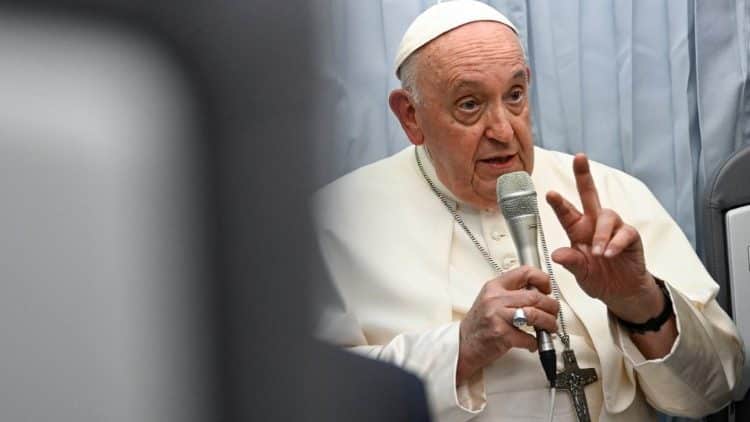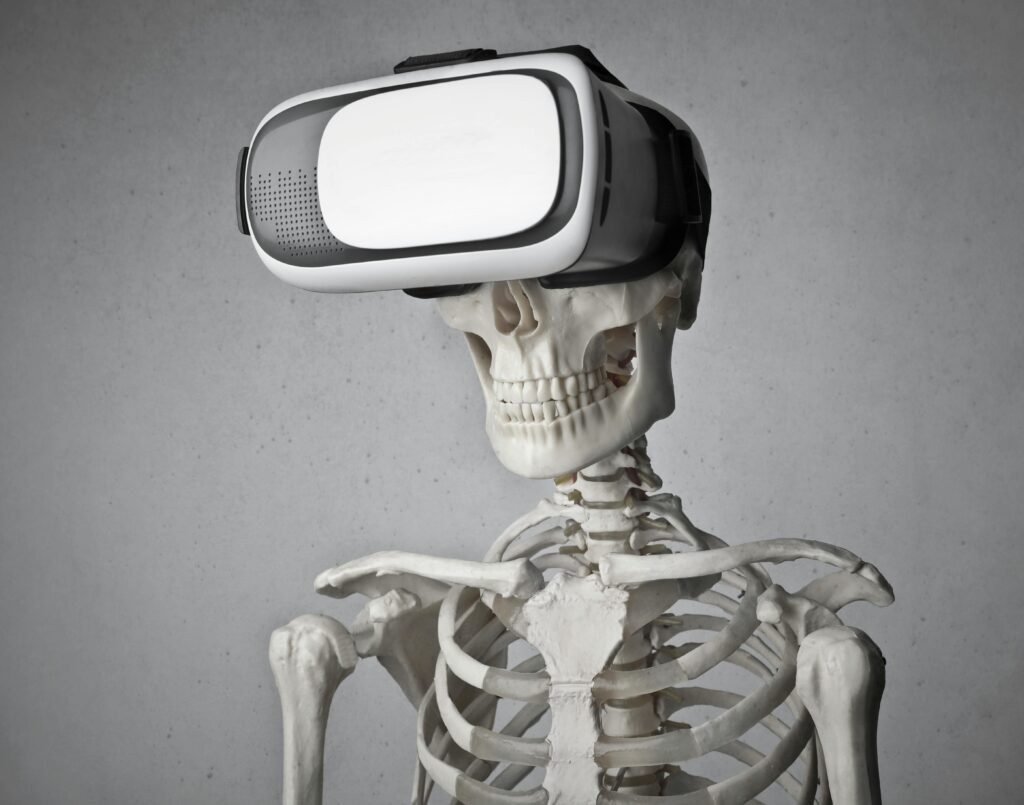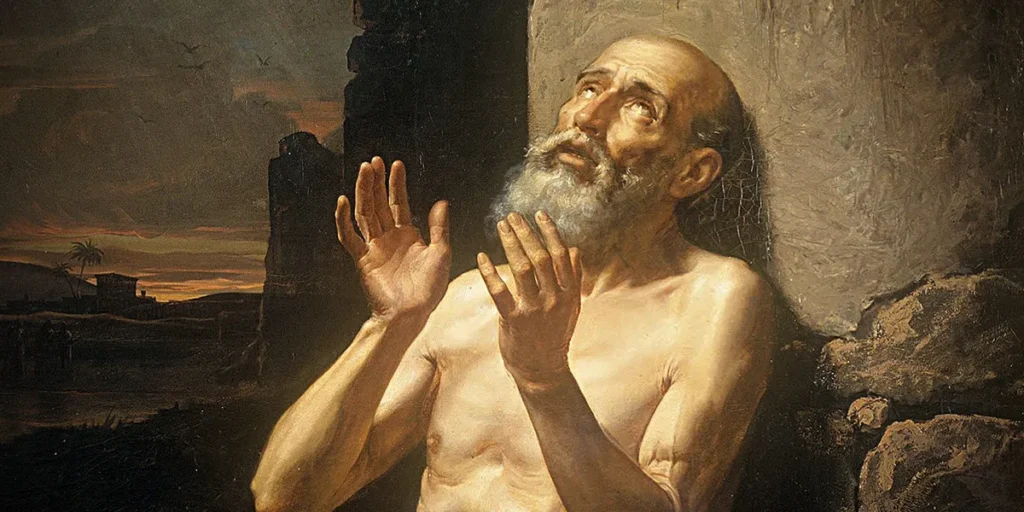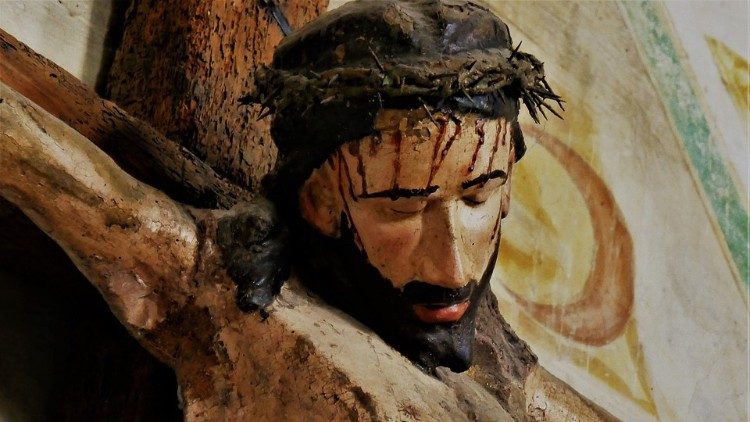Pope Francis: ‘Marseille’s welcome is a message to Europe’
Pope Francis speaks with journalists aboard the papal plane

He held his customary press conference with journalists aboard the papal plane, taking three questions.
Here follows a working English transcription and translation of the press conference:
Matteo Bruni – Director of the Holy See Press Office
Good evening, Your Holiness, good evening everyone. Thank you for taking this time on our return flight. It was a special journey in which you were also able to feel, as His Eminence said, all the affection of the French people who came to pray with you. But I think there are still a few questions or issues that the journalists would like to ask you. Perhaps you would like to say a few words to us.
Pope Francis
Good evening and thank you very much for your work. Before I forget I want to say two things. Today I think it is the final flight of Roberto Bellino [Sound Engineer with the Dicastery for Communication], because he is retiring (applause). Thank you, thank you, thank you! The second thing is that today is Rino’s birthday, the ineffable Rino [Anastasio, ITA Airways coordinator of papal journeys] (applause). Now you may ask your questions.
Raphaële Schapira (France TV)
Your Holiness, good evening. You began your pontificate in Lampedusa, denouncing indifference. Ten years later you are asking Europe to show solidarity. You have been repeating the same message for ten years. Does that mean you have failed?
I would say no. I would say that growth has been slow. Today there is awareness of the migration problem. There is consciousness. And also, there is consciousness of how it has reached a point … like a hot potato that you don’t know how to handle.
Angela Merkel once said that it is solved by going to Africa and solving it in Africa, by raising the level of African peoples. But there have been cases that are bad. Very bad cases, where migrants, like in ping pong, have been sent back. And it is known that many times they end up in lagers; they end up worse than before.
I followed the life of a boy, Mahmoud, who was trying to get out… and in the end he hanged himself. He didn’t make it because he couldn’t stand this torture. I told you to read that book “Brother” – “Hermanito”. The people who come are first sold. Then they take away their money. Then they make them call their family on the phone to send more money. But they are poor people. It’s a terrible life.
I heard one who at night, when boarding a boat, saw a vessel so plain, with no security he did not want to board. And, boom boom. End of story. It is the reign of terror. They suffer not only because they need to get out, but because it is the reign of terror there. They are slaves. And we cannot – without seeing things – send them back like a ping pong ball. No.
That is why I reiterate that in principle migrants must be welcomed, accompanied, promoted and integrated. If you cannot integrate him in your country, accompany and integrate them in other countries, but don’t leave them in the hands of these cruel human-traffickers.
The issue with migrants is this: that we send them back and they fall into the hands of these wretches who do so much evil. They sell them; they exploit them. People try to get flee. There are some groups of people who dedicate themselves to rescuing people with boats. I invited one of them, the head of “Mediterranea Saving Humans” to the Synod. They tell you terrible stories.
On my first trip, you recalled, I went to Lampedusa. Things have got better. They really have. There is more awareness. Back then we didn’t know. Back then they didn’t tell us the truth. I remember there was a receptionist in Santa Marta, an Ethiopian, daughter of Ethiopians. She spoke the language, and was following my journey on the TV. She saw there was someone who explained, a poor Ethiopian, who explained torture and these things. And the translator – this lady told me – he didn’t say everything; he sweetened the situation. It is difficult to trust. So much drama.
That day I was there. A doctor told me: “look at that woman. She walked among the corpses seeking a face because she was looking for her daughter. She didn’t find her.” These dramas…it is good for us to take them in hand. It will make us more human and therefore also more divine. It is a call. I wish it were like a cry. Let us be attentive. Let’s do something.
Awareness has changed. It really has. Today there is more consciousness. Not because I spoke out, but because people have become aware of the problem. So many are talking about it. It was my first trip.
I want to say one more thing. I didn’t even know where Lampedusa was, but I heard the stories: I read something, and in prayer I heard “you must go” As if the Lord was sending me there, on my first journey.
Clément Melki – Agence France-Presse (AFP)
This morning you met with Emmanuel Macron after expressing your disagreement to euthanasia. The French government is preparing to pass a controversial end-of-life law.
Could you kindly tell us what you told the French president about this and whether you think you can change his mind.
We did not speak on this issue today, but we talked about it on the other visit when we met. I spoke clearly, when he came to the Vatican, and I spoke my opinion clearly: life is not to be played with, neither at the beginning nor at the end. We cannot play around. This is my opinion: to protect life, you know? Because then we wind up with a policy of “no pain”, of a humanistic euthanasia.
On this point, I want to cite a book again. Please read it. It’s from 1907. It’s a novel called Lord of the World, written by [Robert Hugh] Benson. It’s an apocalyptic novel that shows how things will be in the end. All differences are taken away, including all pain. Euthanasia is one of these things – a gentle death, selection before birth. It shows us how this man had foreseen some of the current conflicts.
Today we should be careful with ideological colonizations that ruin human life and go against human life. Today, for example, the lives of grandparents are erased, and when human wealth comes into play in the dialogue with grandchildren, they are erased. ‘They are old so are of no use.’ We cannot play with life.
This time I did not talk to the president [about this topic], but last time I did. When he came, I gave him my opinion that life is not something to be played with.Whether it’s the law of not letting the baby grow in the mother’s womb or the law of euthanasia in disease or old age, I’m not saying it’s an issue of faith. It’s a human issue, a human issue. There exists an ‘ugly compassion’. Science has come to turn some painful diseases into less painful events, accompanying them with many medicines. But life must not be played with.
Javier Martínez-Brocal – ABC
Holy Father, thank you for taking the time to answer our questions, for this very intense and dense trip. Up to the last you spoke about the Ukraine and Cardinal Zuppi has just arrived in Beijing. Is there any progress in this mission? At least on the humanitarian issue of the return of the children? Then a somewhat harsh question: how do you personally experience the fact that this mission has not managed to obtain any concrete results so far. In an audience you spoke of frustration. Do you feel frustration? Thank you.
That is true, some frustration is felt, because the Secretariat of State is doing everything to help this, and even the “Zuppi mission” has gone there. There is something with the children that is going well, but this war makes me think that it is also somewhat affected not only by the Russian/Ukrainian problem, but also by the selling of arms, the arms trade. The Economist said a few months ago that today the investments that provide the most income are arms factories, [which are] certainly factories of death!
The Ukrainian people is a martyred people; they have a very martyred history, a history that makes them suffer. It is not the first time: at the time of Stalin, they suffered a lot, a lot; they are a martyred people. But we must not toy with the martyrdom of this people; we have to help them to resolve things in most realistic possible way.
In wars, what is realistic is what is possible, not having illusions: as if tomorrow the two leaders at war would go out to eat together. But as far as possible, where we reach the point of doing what is possible. Now I have seen that some countries are turning back, that they are not giving arms, and are starting a process where the martyr will certainly be the Ukrainian people. And that is a bad thing!
You have changed the subject, which is why I would like to go back to the first subject, the Journey. Marseille is a civilisation of many cultures, many cultures, it is a port of migrants.
At one time there were migrants to Cayenne, those condemned to prison left from there – the archbishop [of Marseille -ed.] gave me Manon Lescaut to remind me of that history. But Marseille is a culture of encounter!
Yesterday in the meeting with representatives of various confessions – they coexist: Muslims, Jews, Christians, but there is coexistence, it is a culture of assistance; Marseille is a creative mosaic; it is this culture of creativity. A port that is a message in Europe: Marseille is welcoming. It welcomes and creates a synthesis without denying the identity of peoples. We have to rethink this issue for the other parts: the capacity to welcome.
Returning to migrants, there are five countries that suffer due to so many migrants, but in some of these countries, there are empty towns. I think of a concrete case I know of, there is a town where there are fewer 20 elderly people and no more. Please let these towns make the effort to integrate.
We need labour; Europe has need of it. Well conducted migration is a richness; it is a richness. Let us consider this migration policy so that it is more fruitful and because it helps us so much.
Now comes the dinner party for Rino and Roberto’s farewell. Let’s stop here; thank you very much for your work and your questions.
This is a working translation and transcription. Words and expressions in parenthesis are provided for clarity.
By Vatican News
Related

Weapons of Mass Stupefaction
José Miguel Ponce
31 March, 2025
3 min

Job, the Mystery of Suffering
Francisco Bobadilla
31 March, 2025
6 min

THE WAY OF THE CROSS: Accompanying Jesus on the way to the Cross
Luis Herrera Campo
31 March, 2025
5 min

Mother Carmen Rendiles, the first Venezuelan saint proclaimed by the Universal Catholic Church
Exaudi Staff
31 March, 2025
3 min
 (EN)
(EN)
 (ES)
(ES)
 (IT)
(IT)

